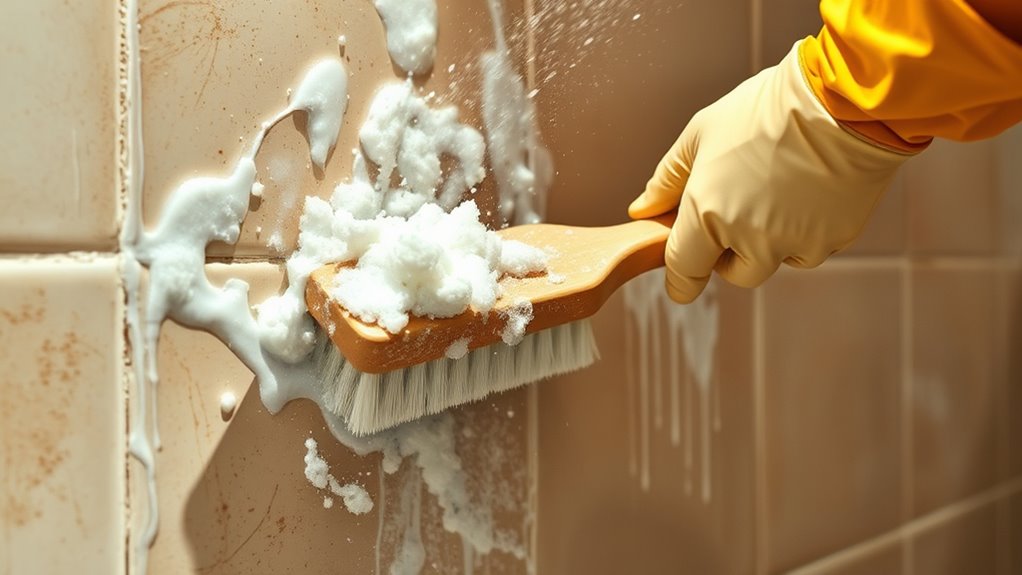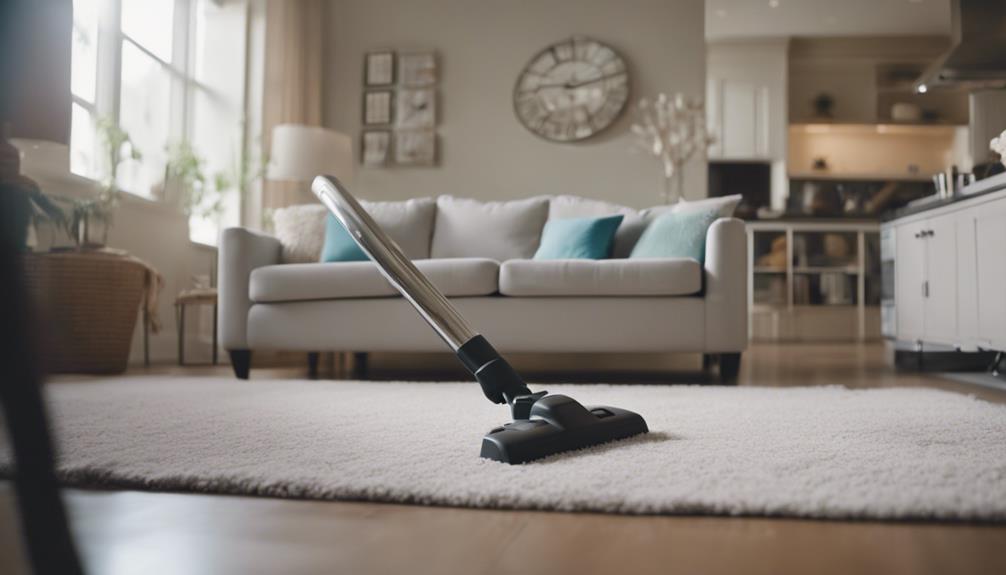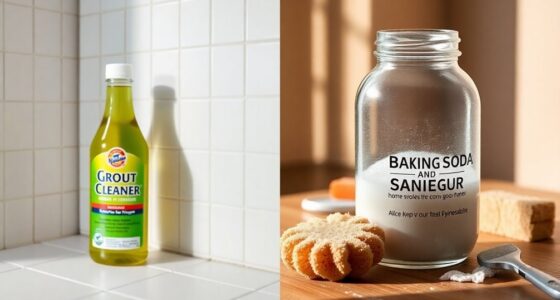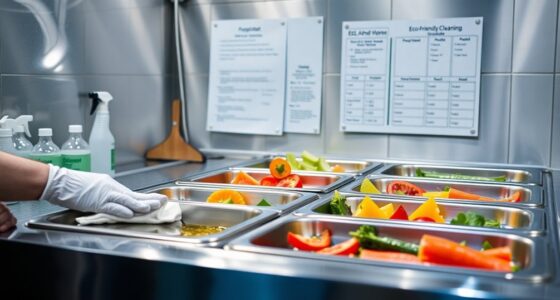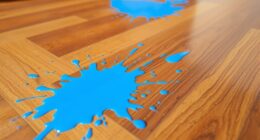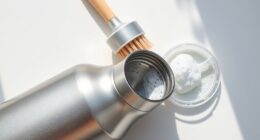If you scrub too often or use harsh cleansers, you may damage your skin’s natural barrier and disturb its microflora. This weakens your skin’s defenses, making it easier for bacteria and irritants to cause problems. Overcleaning can also lead to dryness, redness, and inflammation. Remember, gentle washing with balanced routines helps protect your skin’s health and immunity. Keep going to uncover how to maintain proper hygiene without causing harm.
Key Takeaways
- Overcleaning damages the skin’s natural barrier, reducing its ability to protect against environmental harm and infections.
- Excessive scrubbing kills beneficial skin microbes, disrupting the microbiome and weakening immune defenses.
- Harsh or frequent cleaning strips essential oils, causing dryness, irritation, and increasing skin vulnerability.
- More cleaning does not equal better hygiene; gentle, balanced routines preserve skin health and overall immunity.
- Supporting a healthy skin microbiome through proper cleansing enhances resistance to germs and prevents damage.

While keeping things clean is important, overcleaning can actually do more harm than good. When you scrub excessively or rely heavily on harsh cleaning products, you risk disrupting your skin’s natural barrier. Your skin isn’t just a surface; it’s a complex defense system designed to protect you from germs and environmental damage. Overcleaning can weaken this barrier, making it less effective at resisting germs. Instead of reducing your risk of illness, you might inadvertently increase it by stripping away the protective oils that keep bacteria and other pathogens at bay.
Overcleaning weakens your skin’s barrier and defenses, increasing vulnerability to germs and infections.
One of the key issues with overcleaning is that it can diminish your skin’s germ resistance. Your skin contains natural microorganisms that help defend against harmful bacteria. When you remove these microbes too aggressively, you upset the delicate balance, leaving your skin more vulnerable to infections. This can be especially problematic if you use antibacterial soaps or disinfectants that kill beneficial bacteria along with the harmful ones. Over time, this constant assault on your skin’s microbiome can lead to a weakened immune response, making you more susceptible to illnesses rather than protecting you from them.
Additionally, frequent or aggressive cleaning often results in skin irritation. Harsh chemicals, strong fragrances, and repeated scrubbing can strip away the natural oils your skin produces, leading to dryness, redness, and inflammation. Skin irritation isn’t just uncomfortable; it can also compromise your skin’s ability to serve as an effective barrier. When your skin is irritated or broken, bacteria and other irritants can penetrate more easily, increasing the risk of infections. Overcleaning, thus, creates a vicious cycle—irritated skin invites more cleaning, which further damages the skin and heightens your vulnerability.
It’s tempting to think that scrubbing more vigorously will keep you safer, but that’s not the case. Proper hygiene isn’t about overdoing it; it’s about balance. Using gentle cleansers and washing your hands thoroughly but not obsessively helps maintain your skin’s natural defenses. Remember, your skin is a living organ that needs care, not just constant attack. When you overclean, you’re not only risking skin irritation but also undermining your body’s ability to resist germs naturally. Striking the right balance ensures you stay healthy without compromising your skin’s integrity or immune defenses.
Being aware of skin microbiome health and how overcleaning impacts it can help you develop better hygiene habits that support your overall well-being.
Frequently Asked Questions
Can Overcleaning Cause Skin Irritation or Allergies?
Overcleaning can definitely cause skin irritation or allergies. When you scrub too much, you damage your skin barrier, making it easier for allergens to penetrate and trigger allergy flare-ups. Using harsh soaps or excessive washing strips away natural oils, leaving your skin dry and sensitive. To protect your skin, stick to gentle cleansers and avoid overdoing it, which helps maintain your skin’s health and prevents irritation or allergy symptoms.
How Often Should I Really Clean My Household Surfaces?
You should clean your household surfaces regularly, but not obsessively. Aim to wipe down high-touch areas daily to prevent dust buildup and reduce bacteria. Deep clean weekly, paying attention to places prone to germs. Overcleaning can lead to bacterial resistance and skin irritation. Balance is key—clean enough to stay safe but avoid excessive scrubbing that might do more harm than good.
Does Using Natural Cleaning Products Reduce Overcleaning Risks?
Using natural cleaning products can help reduce overcleaning risks because they often contain natural ingredients that are gentler on your skin and surfaces. By choosing these alternatives, you minimize chemical exposure, which can irritate your skin or cause other health issues. Plus, natural cleaners encourage more mindful cleaning habits, preventing excessive scrubbing. So, switching to natural ingredients not only maintains cleanliness but also promotes a safer, healthier environment.
Are There Specific Materials More Vulnerable to Damage From Overcleaning?
You should be cautious with delicate fabrics, fragile electronics, and antique surfaces, as these materials are more vulnerable to damage from overcleaning. Excessive scrubbing, harsh chemicals, or frequent cleaning can weaken fibers, cause corrosion, or degrade finishes. Instead, use gentle methods, mild cleaners, and minimal effort. Protect your valuables by understanding their sensitivity, and remember that sometimes less cleaning preserves their integrity better than constant scrubbing.
Can Overcleaning Impact the Longevity of Household Items?
Constant cleaning can definitely impact the longevity of your household items. If you increase cleaning frequency without considering material sensitivity, you risk causing wear and tear. Some materials, like wood or delicate fabrics, can degrade faster with excessive scrubbing or harsh chemicals. To protect your belongings, adjust your cleaning routine based on each item’s material and avoid overcleaning, which can lead to premature damage and reduce their lifespan.
Conclusion
So, next time you reach for that scrub brush, think twice. Imagine your skin as a delicate garden, where too much cleaning strips away the vibrant blooms and leaves it vulnerable. Sometimes, less is more—letting your natural defenses rebuild and flourish. By easing up on the scrubbing, you allow your skin to breathe, heal, and stay resilient. After all, true cleanliness isn’t about overcleaning, but about nurturing what keeps you healthy.

